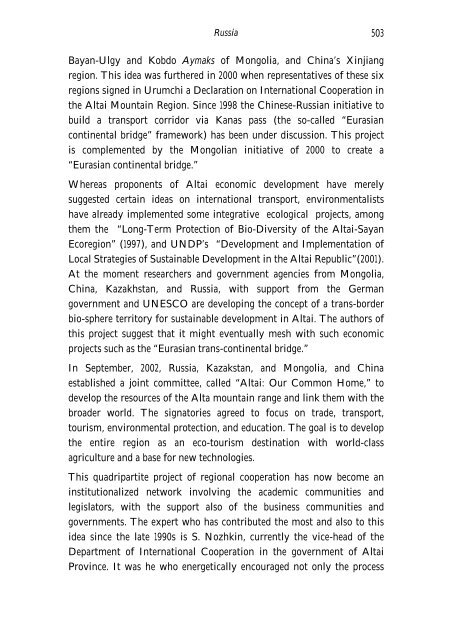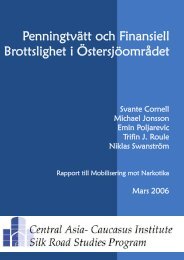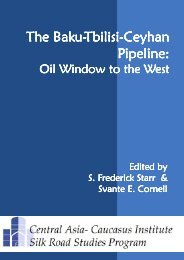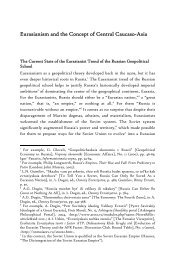Russia - Central Asia-Caucasus Institute and Silk Road Studies ...
Russia - Central Asia-Caucasus Institute and Silk Road Studies ...
Russia - Central Asia-Caucasus Institute and Silk Road Studies ...
Create successful ePaper yourself
Turn your PDF publications into a flip-book with our unique Google optimized e-Paper software.
<strong>Russia</strong> 503<br />
Bayan-Ulgy <strong>and</strong> Kobdo Aymaks of Mongolia, <strong>and</strong> China’s Xinjiang<br />
region. This idea was furthered in 2000 when representatives of these six<br />
regions signed in Urumchi a Declaration on International Cooperation in<br />
the Altai Mountain Region. Since 1998 the Chinese-<strong>Russia</strong>n initiative to<br />
build a transport corridor via Kanas pass (the so-called “Eurasian<br />
continental bridge” framework) has been under discussion. This project<br />
is complemented by the Mongolian initiative of 2000 to create a<br />
“Eurasian continental bridge.”<br />
Whereas proponents of Altai economic development have merely<br />
suggested certain ideas on international transport, environmentalists<br />
have already implemented some integrative ecological projects, among<br />
them the “Long-Term Protection of Bio-Diversity of the Altai-Sayan<br />
Ecoregion” (1997), <strong>and</strong> UNDP’s “Development <strong>and</strong> Implementation of<br />
Local Strategies of Sustainable Development in the Altai Republic”(2001).<br />
At the moment researchers <strong>and</strong> government agencies from Mongolia,<br />
China, Kazakhstan, <strong>and</strong> <strong>Russia</strong>, with support from the German<br />
government <strong>and</strong> UNESCO are developing the concept of a trans-border<br />
bio-sphere territory for sustainable development in Altai. The authors of<br />
this project suggest that it might eventually mesh with such economic<br />
projects such as the “Eurasian trans-continental bridge.”<br />
In September, 2002, <strong>Russia</strong>, Kazakstan, <strong>and</strong> Mongolia, <strong>and</strong> China<br />
established a joint committee, called “Altai: Our Common Home,” to<br />
develop the resources of the Alta mountain range <strong>and</strong> link them with the<br />
broader world. The signatories agreed to focus on trade, transport,<br />
tourism, environmental protection, <strong>and</strong> education. The goal is to develop<br />
the entire region as an eco-tourism destination with world-class<br />
agriculture <strong>and</strong> a base for new technologies.<br />
This quadripartite project of regional cooperation has now become an<br />
institutionalized network involving the academic communities <strong>and</strong><br />
legislators, with the support also of the business communities <strong>and</strong><br />
governments. The expert who has contributed the most <strong>and</strong> also to this<br />
idea since the late 1990s is S. Nozhkin, currently the vice-head of the<br />
Department of International Cooperation in the government of Altai<br />
Province. It was he who energetically encouraged not only the process






